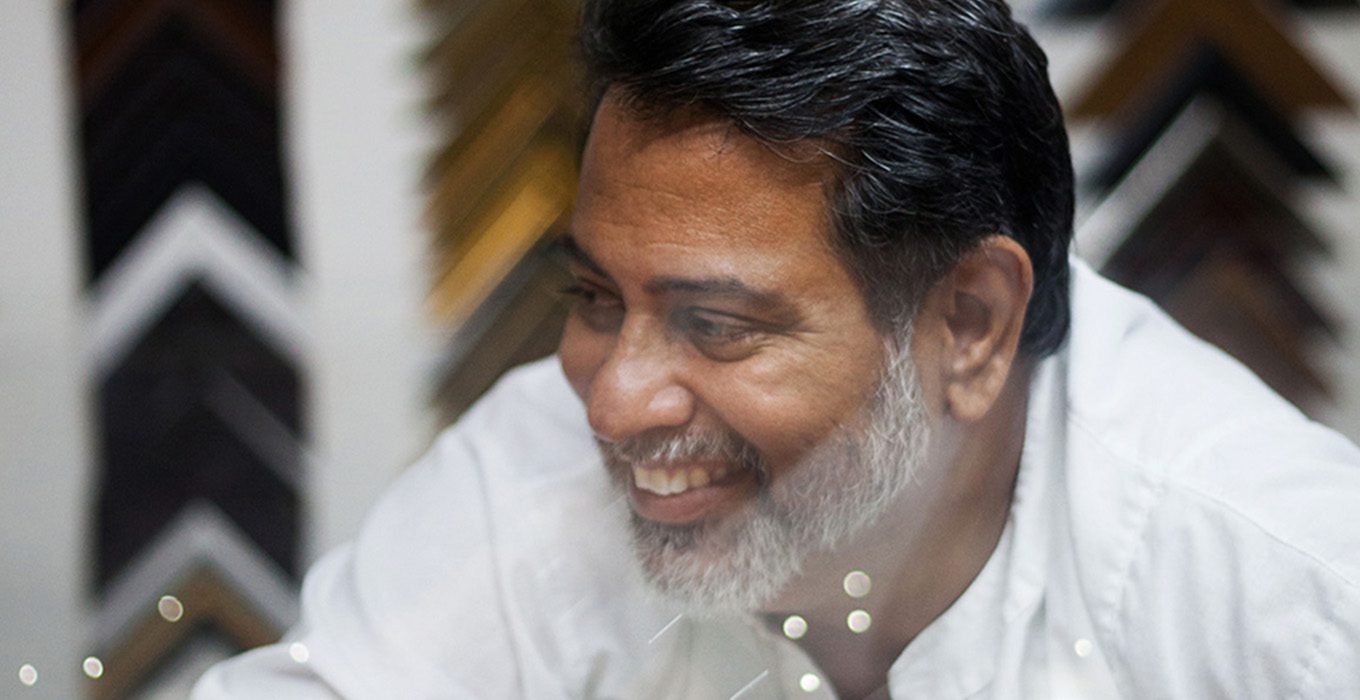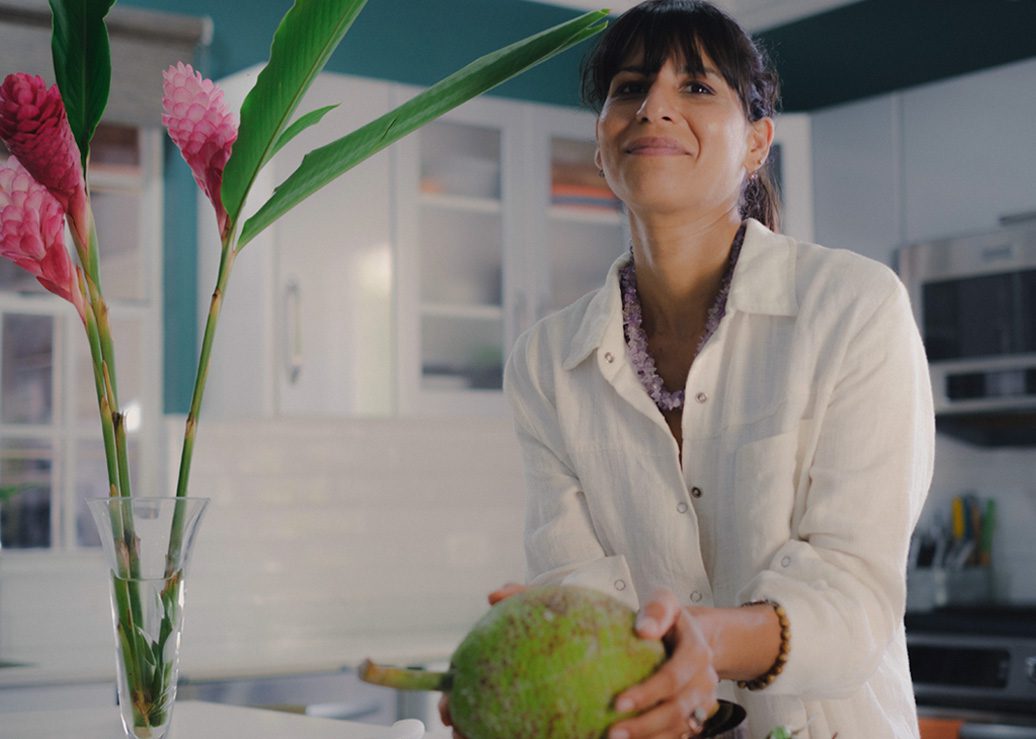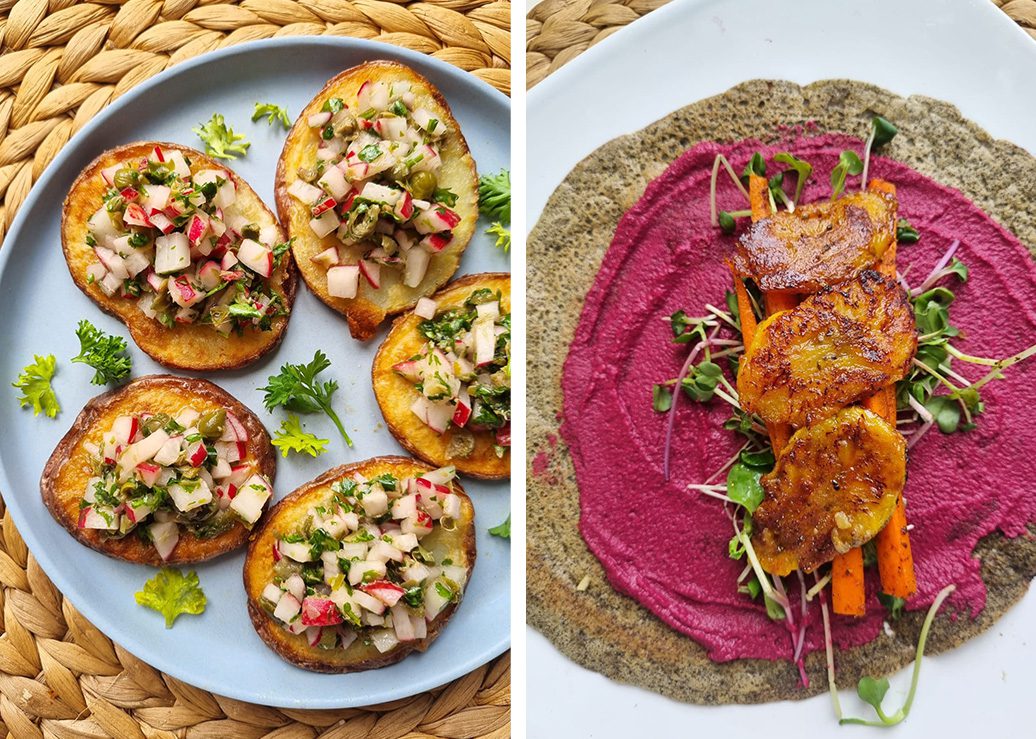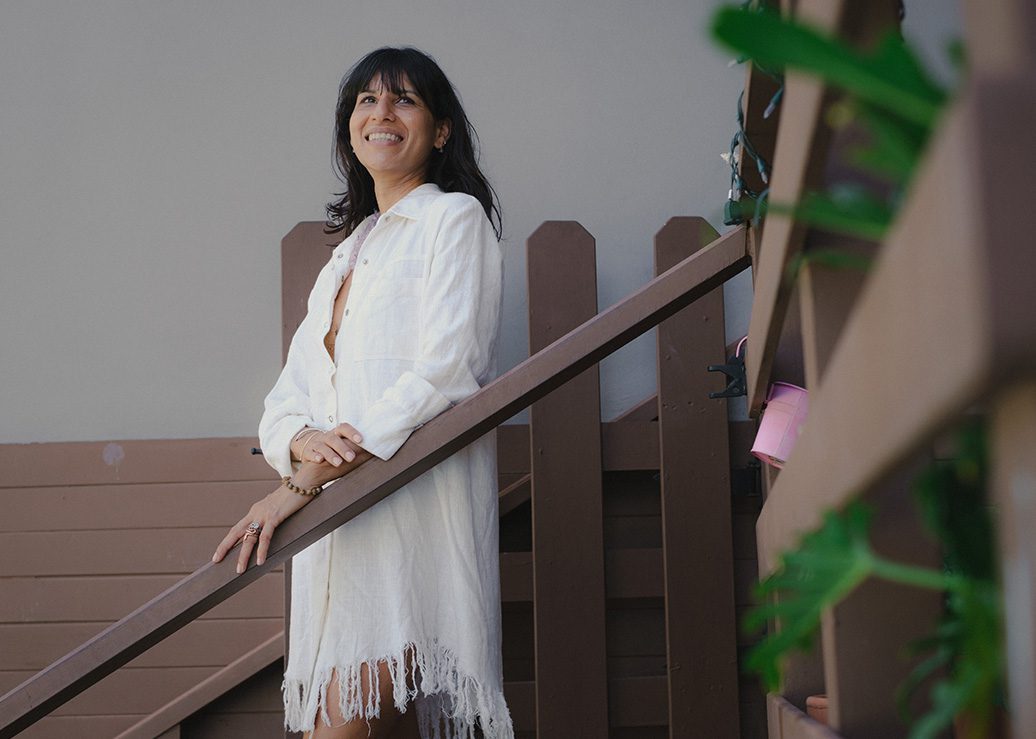

JULY 14th, 2024
I first came to know Jeunesse Pouchet when she owned the very first vegan café in Trinidad and Tobago; ‘The Youthful Vegan’ back in 2013. Now Jeunesse has added ‘Ayurvedic Wellness Advisor’ to her title, sharing insights on holistic health, in addition to delicious plant-based meals through her social media and website.
Ayurveda is one of the world’s oldest healing systems, originating in India. As Pouchet explains, “Ayurveda is all about tapping into your innate knowledge, that wisdom that lives inside you, that lives inside all of us. But, are we able to tap into it?” This ancient practice emphasizes the interconnectedness of the mind, body, and spirit, and how our daily habits and lifestyle choices impact our overall well-being.
Pouchet recognizes that achieving a healthy physical, mental, and emotional balance amidst life’s challenges can be difficult. However, she believes this quest for balance is worthwhile and involves continuous work. By combining her expertise in plant-based nutrition and Ayurvedic principles, Pouchet aims to help others find more harmony and fulfillment in their lives.
back when I worked at an advertising agency almost a decade ago, there was a vegan coworker, and whenever we were out late, she would always end up eating doubles because there were no other vegan food options available late on a Friday night in Port of Spain
Jeunesse: There was nothing else. But it is so wonderful to know that our very popular Trinidad dish is vegan. I used to love to say to people, “you know we have doubles, and doubles are vegan.”
Over the past year or two, you’ve undergone a transition in your online presence. From “The Youthful Vegan” to “Youthful_Jeunesse”. In addition to your main profile, you’ve also created a new account, @svastha_health_ What motivated the changes?
Jeunesse: I’ve been trying to remove labels, because we shouldn’t have to carry a label on ourselves, and I found that I was in this category where I’m vegan, and that’s fine because that is what I chose for myself, but when I changed my name, I wanted to be truthful with the information that I put out there. So, I don’t want to say that I’m vegan but that I follow a plant-based diet.
What was early life like growing up?
Jeunesse: When I was younger, I was a bit of a ‘picky eater’ but I ate a lot of fruit and I loved my vegetables. When my mother came home from the market with carrots, I would grab a carrot and eat it. Things like that – watermelon and everything. I did enjoy meat at the time, but I didn’t eat a lot of it. My family is Indian and we grew up eating a lot of vegetarian dishes. My family is also Muslim so we never ate pork.
When I was younger, we lived on a street with family and we had chickens, ducks and goats, and I loved animals. The animals were well taken care of but my dad or uncle would kill them for food. However, my brother and I had our own ducks as pets that weren’t allowed to get killed. Later when we no longer had these animals, I asked for chickens as pets, but when the chickens got older my dad said that “you don’t play with them anymore and we should kill them before the meat gets too tough” I agreed. He shared the meat with my family on the street, but I refused to eat my own pet. I just couldn’t.
In college, while studying Hospitality, and Event Planning. I had a project to do where we got to choose our own topic and I chose Animal Factory Farming. I did a lot of research, and watched videos about animal cruelty in the factories — it was heartbreaking! So first I stopped eating meat during the week; I only ate meat once a week, because I said, you know what, I want to minimize my impact. I did not want to be part of this cruelty. No matter how much one person may not be making this huge difference with the huge number of animals that were being killed, I know and my conscience was telling me that I am not supporting this in any way, any longer.
Why did you close your vegan cafe and when did you discover Ayurveda?
Jeunesse: I’ve always loved to cook. So, when I transitioned to a plant-based diet I thought it was really fun to try altering my way of cooking and get creative. A year later I opened up the Youthful Vegan café, it was the first vegan establishment in Trinidad, and I did that for 4 years. I decided to close the cafe when I got pregnant with my second child, and do catering from home instead. It was tough closing the café.
I am very grateful that I learned about the benefits of eating plant-based before I had my children, because I think it set the stage for me and how I want to raise them and feed them. A few years later I found Ayurveda. I like to say that my soul led me to Ayurveda because it happened so naturally. It was something that piqued my interest for a while and when I began to study Ayurveda I immediately fell in love. I know that this was in me all along.
Could you tell me more about the function of food in your Ayurvedic practice?
Jeunesse: Ayurveda has taught me so much in terms of energy – what we eat, what we consume, how we do it, how we go about eating and how all that affects our bodies and affects our energy. It’s been very eye-opening because I’ve always been a mindful eater, per se, but the level of my mindfulness is entirely different to where it was before, where I think keeping it simple is what I’ve been trying to achieve more and more – keeping my food as simple as possible. Yes, that means that I’ll have to cook more, and spend more time preparing my ingredients, but keeping my ingredients as simple as possible, and enjoying the beauty of simplicity of food is worth it. I really want simplicity because I know my body feels great – with simplicity.
Ayurveda is an ancient natural healing system and a holistic one that originated some five to twelve thousand years ago in India. The wonderful thing about Ayurveda is that it originated from the Vedic text, which is where Yoga came from as well. Ayurveda and Yoga are sister sciences. Ayurveda translates to science of life or knowledge of life, and Yoga is union and the science of meditation. They work hand in hand as a natural healing system and a holistic way of living.
Ayurveda and yoga, I think, is a beautiful integration of spirituality and science.
How did you come across Ayurveda?
Jeunesse: I think I found Ayurveda because I was always a spiritual seeker; I was always very intrigued by religion and spirituality.
Although, I went through a stage where I was “atheist” for a few years. I think this was because there was something about organized religion that didn’t resonate with me. I needed to experience these things myself and not be told what I should believe.
Now I think I finally found what really speaks to me, because it is not a religion; it is not a philosophy; it is simply a way of life, of connecting to this divine consciousness which we all reside in. You know, this unity, this oneness, that people reside in; and so, everyone can have their own ideas of that – what divine consciousness is.
I think Ayurveda was a beautiful way to tap into spirituality in a way that made sense to me. I’m not going to believe something if it does not make sense to me. And in Ayurveda you learn that about it. It says that one of the most damaging things you can do to yourself is to have an un-investigated belief system.
Whatever belief system you choose – or if you want a belief system – make sure and investigate it so you know what it is that you’re doing, or practicing, and that it really aligns with your core values or feelings.
Ayurveda is really a path of self-discovery. It’s all about tapping into your innate knowledge, that wisdom that lives inside you, that lives inside all of us. But, are we able to tap into it? – To tap into it we need to have clarity, and clarity can only happen when we are free of blockages in the mind and body.
Blockages caused by food?
Jeunesse: Food is one part. So with Ayurveda, there are three main pillars of health and these are – Ahara (food), Nidra (sleep) and Brahmacharya (sexual energy). It is how you manage these three aspects in your life, and they must be in balance for us to be in balance. how and what you eat, the quality of sleep, and how you manage your sexual energy.
So these three areas are what I work on with a client: lifestyle, diet, and routine. And of course, Yoga, as well. We use Yoga for therapy, integration and meditation.
The whole aspect of your life needs to be in balance for optimum well-being,
And it’s about continuous progress, there is no need for perfection. Continuous work and awareness would make these things happen for you. And it makes your life so much more beautiful when you have these things in control.
Can you tell me a bit about the process of working with a client.
Jeunesse: First we start with a consultation. Ayurveda is a holistic approach so we would analyze the three main pillars in your life, throughout the consultation process and questionnaire. Then I go through a variety of symptoms to assess what imbalances you may have and how we are going to reach this balance, through diet, lifestyle and routine.
Ayurveda and yoga are all about moving with the rhythms and cycles of nature. We’re part of nature, and I think maybe some of us may know it but may not really understand it or feel it. If you genuinely feel and understand that you are part of nature and that is the only way we exist, we’re going to go right back there when we’re finished – into the ground, literally. Our bodies will become part of this earth, one way or another.
Ayurveda is becoming very popular in the western world. I’m not sure how widely known it is in Trinidad and Tobago…
Jeunesse: Ayurveda is coming to the Western World because people are seeking knowledge. People are now coming to this realization that what they’ve been doing hasn’t been working, that what the food industry has been selling us and teaching us has not been working because now we’re having so many health issues. And the knowledge is being spread that the way we live and eat is really what is going to determine your health.
Food and lifestyle affects your health. We need to stop thinking that one medicine is going to fix your solution if you’ve been eating horribly or misusing the 3 pillars of health your whole life. Medicines are quick fixes. — If you want a quick fix, then yes take the medication, but it is not sustainable as a long-term fix. Yes, you need medicines immediately for some reasons, like when an emergency happens, I would never say that western medicine is not needed or anything; that is not true; we need it for certain things. A lifestyle change is long-term work but it is more beautiful, for sure.
The quality of our food is very important because this flesh that we have, is an accumulation of food. Sadu sadi! Beautiful!
The physical body is literally an accumulation of food. That is the only way we got to this level, and that is how we can see how some people are malnourished or not. You can see it through the body.
If you had to recommend a few local ingredients that you think should become staples of our diet, what would those be?
Jeunesse: I try to use as much local produce as possible. ARC (Alliance of Rural Communities of Trinidad and Tobago) supplies me with local chemical free produce. I usually buy my organic spices, grains, seeds, nuts and legumes from the gourmet stores or when I travel.
I would say, simplicity is the best, and as basic as it gets, dhal and rice, stew peas and rice.. Yup! And some crunchy substances, like some toasted seeds, with a side of greens, and or cooked vegetables, is the kind of food we eat on a regular basis. This is what I enjoy, and my kids love it. And that’s why I say, these are such easy meals to make. I would recommend investing in an electric pressure cooker like an instant pot to quickly and effectively cook your grains and legumes.
A lot of times, in our Trinidadian-based meals, like the Sunday lunch and stuff, we’re used to peas/ meat, rice/macaroni pie. Now you’re having two types of proteins and a variety of grains. This can be a lot for the body to digest and process.
So I would always recommend keeping it simple- peas or beans, rice or some sort of grain with nutrient rich spices and herbs. You don’t need to complicate it, it is not very expensive, and you don’t need a ton of packaged ingredients to make that. Staying away from highly processed and adulterated foods is the best thing you can do for your health!
We’ve been having a lot of conversations around the idea of envisioning and creating future Caribbean at Designer Island. We have to keep working towards positive change. When considering how we create a better future for Trinidad and Tobago, what are some of the things you’d like to see changed or implemented?
Jeunesse: I would say, two main things that I would love to see in the Caribbean – in Trinidad and Tobago in particular – is to have a lot more attention focused on our waste mismanagement and its impact on the environment, and how we treat our country in that regard. I would also like to see everyone have access to nourishing and organic foods. I think that is the right of every person. If you can establish that in your country then that is true wealth, because it is health, and that is the foundation of having a healthy mind, if our bodies are continuously being filled with chemical-based foods, we can’t think right, or function effectively. But if we fix it – the quality of our foods and everybody having access to nourishing foods – we can have humans that are healthy, with a considerable amount of awareness because they are being nourished well.
If we focused less on the meat and dairy industry – and I am not saying that that is totally not needed – but if we focus less on that, and less on producing processed foods, and instead focus a lot more on growing organic or chemical free foods. I believe that we could feed our country and our children in particular would not be subjected to this very processed-packaged quick foods all the time. Creating a society that is not focused on convenience only but more on quality. And I know some people would say, oh, you have the time, the opportunity to cook and all these things. Yes, they are right to a certain extent. However, I make the time. Yes, I do understand that I’m privileged enough to have access to these things but that should never be a privilege. It should be accessible for all!
So, my last question is about your magazine. When is that coming back and could you talk a bit about it?
Jeunesse: We recently decided to scrap the magazine this year and work on my cookbook. My friend Ariann Thompson and I are the creators of The Youthful Vegan digital magazine- From Plants to Plates. We originally planned to put out our third issue of the magazine this year. However, we recently decided to pivot away from the magazine and work on a cookbook instead. It will include mindful eating tips and some stuff on Ayurveda. The cookbook will be focused on simple ways to create nutrient rich, and balanced meals. This is something we are very excited about, because we have a fun idea for the cookbook that we can’t wait to share.
Thanks Jeunesse, we’re looking forward to it.


follow: Youthful Jeunesse
Interviewer: Tanya Marie | Photographer: Errol John | Food Photography by Jeunesse